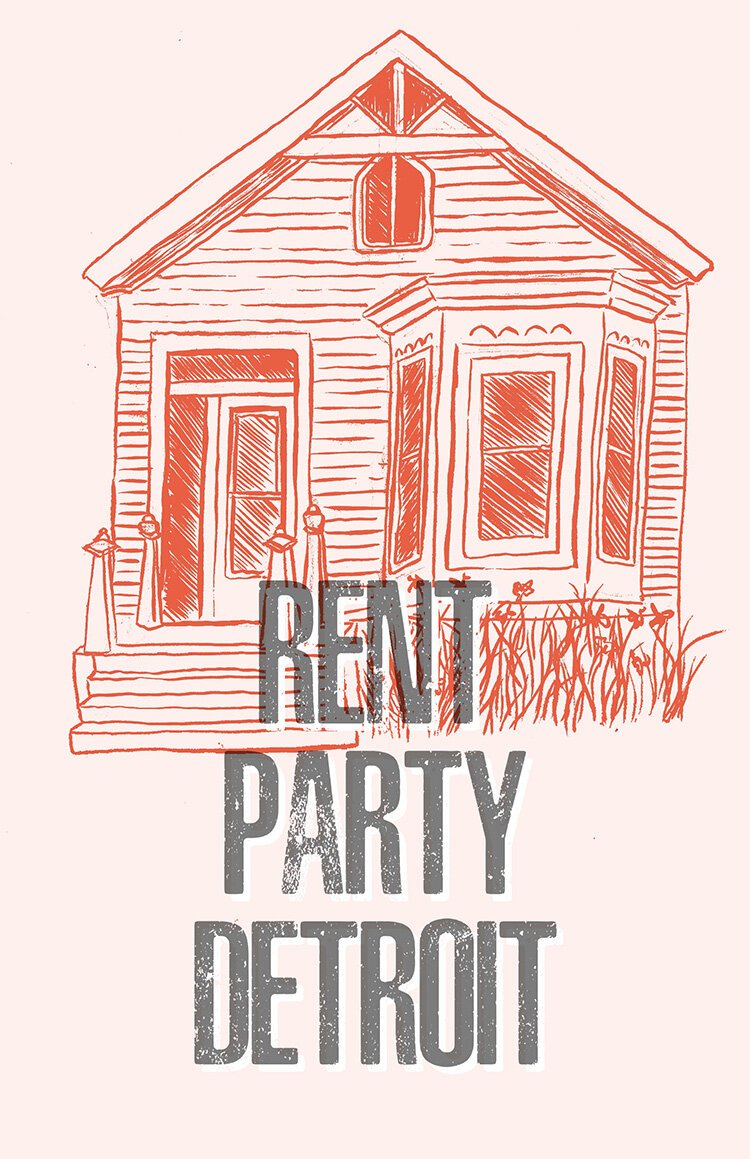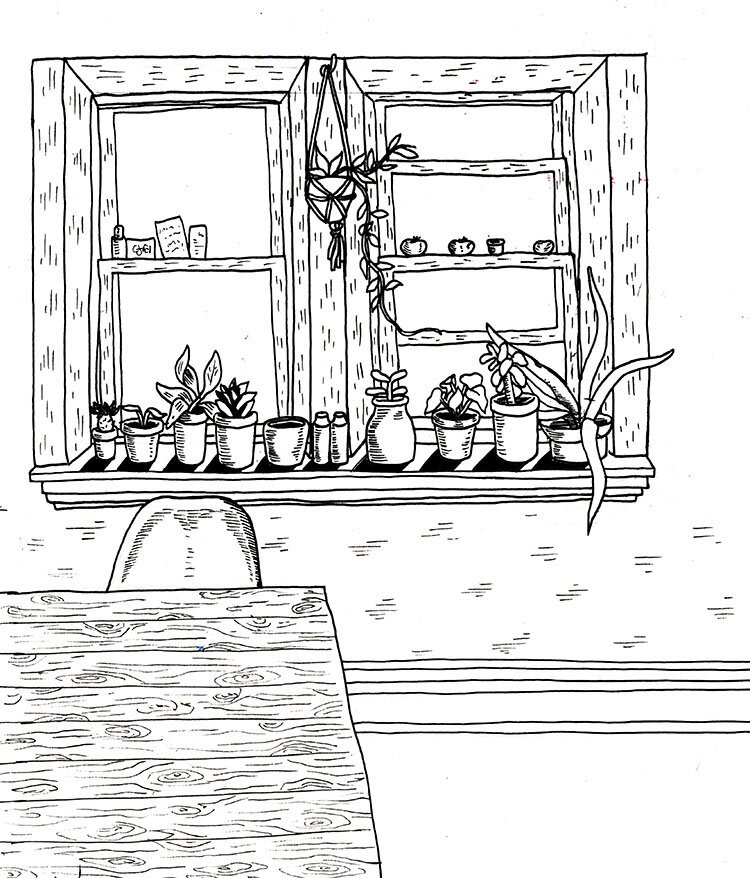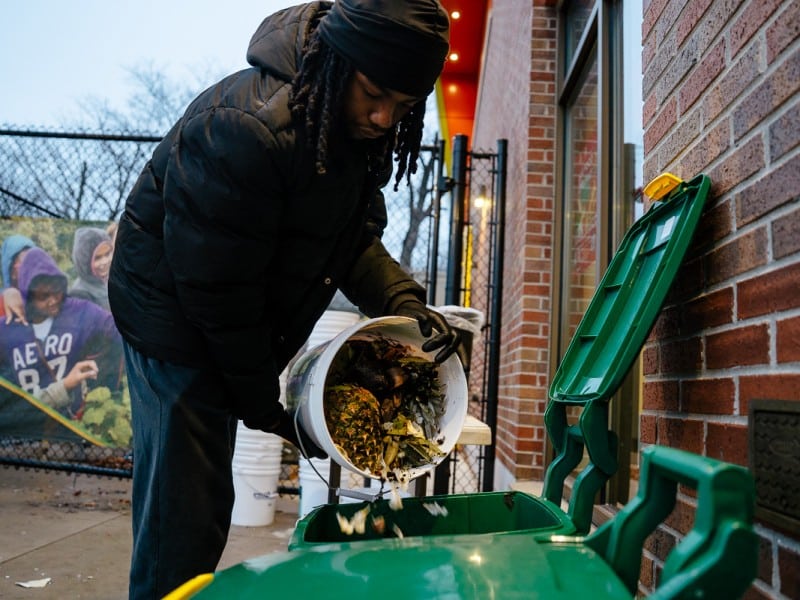Art and activism: How Rent Party Detroit is addressing the city’s eviction problem
Inspired by Harlem's rent parties and driven to action by what she saw in court as an eviction defense attorney, Linda Jordan launched Rent Party Detroit to help Detroiters facing eviction.
In the early 1920s, more than 200,000 Africans Americans from the South migrated to New York, lured by the promise of jobs and the magic of the Big Apple. They settled in Harlem, where sometimes as many as 5,000-7,000 people were crammed into one block. In addition to the overcrowding, demand for apartments soared, driving up the rents. Unlivable living conditions plus exorbitant rent equaled an affordable housing crisis.
Fast forward to the ‘40s. The Harlemites tried to figure out a way to pay the skyrocketing rent, and one innovative and socially conscious resident got the idea to throw a party to raise money to help pay the bills. The Saturday night party was an overnight success and the concept spread. For the price of admission (25 cents) guests could feast on fried chicken and pork chops, indulge in bathtub gin, and dance into the wee hours of the morning.
Inspired by the concept of the Harlem rent parties and moved to action by what she saw in her work as an eviction defense attorney in Detroit, Linda Jordan launched Rent Party Detroit, a sponsored project of Allied Media Projects that raises money through cultural events to prevent eviction and provides education on housing inequity.
“One of the key things that we want to do is educate people that eviction is a community problem. So often we force people to face eviction alone, and it’s seen as a very shameful thing. But we have a system that produces these unjust results. And this is truly a community problem that needs a community solution,” Jordan said at the most recent rent party in November, a zine launch party and poetry reading.
In Detroit, where there are more renters than homeowners, eviction is an ongoing threat even under normal circumstances. From 2014-2018, there were nearly 30,000 eviction filings from 2014-2018 per year, according to a working paper published in May by the University of Michigan’s Poverty Solutions. Filing rates vary widely from neighborhood to neighborhood; for example, in Southwest Detroit, eviction rates are 170% while in the Poletown East neighborhood the rate is 2.6%. And amid the pandemic, according to the U.S. Census Bureau’s Household Pulse Survey, more than 30% of people in Metro Detroit are facing the likelihood of eviction or foreclosure.
So far Rent Party Detroit has raised about $5,000 from 100 donors and plans to give the first disbursement to the United Community Housing Coalition in January because that’s when funds that have been allocated to help tenants affected by the pandemic dry up. The nonprofit provides housing assistance to low-income residents.
Ted Phillips, executive director of UCHC and an attorney for nearly 40 years, welcomes the help.
“We need everything we can. And we need people to be energized around it,” Phillips says.
The catalyst for launching Rent Party Detroit was Jordan’s experience working at 36th District Court representing tenants. Jordan would see countless harrowing stories of tenants facing eviction.
“When I began doing eviction defense work, I was shocked to see some of the conditions of the places my clients were living. One in particular stands out. Every time it rained, the basement was flooded with sewage. Despite standing sewage in the basement, the landlord had the audacity to drag the tenant into court and demand payment,” Jordan says (it was profiled in this Detroit News story).
In addition to her work as a lawyer, Jordan is also a musician, playing guitar and singing in the band Best Exes after she moved to Detroit in 2014, the “height of the tax foreclosure crisis,” she says. She was also part of the Seraphine Collective, a collaborative support network of women and nonbinary musicians, artists, and DJs. These days the band isn’t active but she keeps using her creative muscle by writing poetry.
So she combined her advocacy work with her creative background to create Rent Party Detroit with the goal to start a revolving fund to prevent evictions and address the narrative around evictions.
“Eviction has always been treated as a personal problem, a sort of a shameful thing that people had to face alone. And it really shouldn’t be that way, because we have these systemic forces at play. So I want to create a space for people to say, ‘No, that’s not acceptable in my city.’ ”
She had the idea to start the organization last year but after she changed jobs (she now works with the Center for Civil Justice in Flint), the project was put on the backburner. Then the pandemic hit.
“How am I going to launch something in the middle of pandemic where the primary model is to raise money from social and cultural events when people aren’t having social and cultural events? But at the same time, the need was just so great. Now we have people who don’t have savings, and then we have people who couldn’t work,” Jordan says. “I didn’t want to I didn’t want to miss this opportunity because people were really engaged with what was happening in our city.”
She started holding events virtually earlier this year. In November she wrote and published a zine illustrated by local artist Lucy Cahill and held a poetry reading on Zoom featuring Nandi Comer, Zoya Gurm, and Francine J. Harris. The next event is a holiday concert fundraiser set for Dec. 23 featuring Bevlove, Anna Burch, Little Animal, Kelly Jean Caldwell, and Hadassah.
The pandemic prompted a series of short-term fixes to address the housing crisis. When COVID-19 hit, Gov. Gretchen Whitmer temporarily halted evictions through a statewide moratorium, which was lifted in July. Around the same time, the state established the Eviction Diversion Program, which allocated $50 million to help renters and landlords. 36th District Court (which has been closed since November and will reopen in January), issued its own moratorium through mid-August, and in September, the Centers for Disease Control and Prevention ordered a temporary ban on evictions through the end of the year.
The CDC moratorium was another instance when “we could breathe a little bit easier,” Jordan says, but it was an incomplete fix. “And the federal government has actually undercut its effectiveness. People are still being evicted under this moratorium. It’s not a complete moratorium. And it puts a huge onus on tenants to sort of prove that they were hurt by the pandemic, which I don’t think should have been the intention of it.”
She continued “it’s being interpreted in a way that doesn’t provide as much protection as I think there should be. So all of these moratoria really are just pushing the problem down the road.”
Come January, both Jordan and Phillips fear a wave of evictions.
“The situation is dire. Congress has yet to come through with additional aid and no additional money has been allocated to eviction diversion by the state. If something isn’t done, we are facing an eviction catastrophe unlike any we’ve ever seen, in the middle of a pandemic that requires people to shelter in place. It is not hyperbole to say that failing to act will result in people dying,” Jordan says.
“There is potential for being massive evictions come January and February,” Phillips says.
During this time, he says, “anecdotally we’re seeing people owing way more than they normally would owe, in some instances, $5,000 and $6,000. And I can tell you that after Dec. 31, if there’s not help provided to these folks, there will be very, very limited amounts, as of right now, very, very limited amounts that can be paid and it will be limited in terms of who it can be paid for.”
Jordan knows a fund like this “is never going to be able to raise enough money to meet the need. The need is just too high. But I think the value is thinking about it not as charity but as political action. And … [recognizing] there are a lot of problems and systemic injustice baked into the system. But we can do things to help our neighbors. We need to work on these systems that are hurting people. There’s also a very urgent need right now of people being evicted and we shouldn’t let that stand in our city.”
For more information on Rent Party Detroit, check out the website and Instagram, and for more information on the Dec. 23 fundraiser, check out the Eventbrite page.









